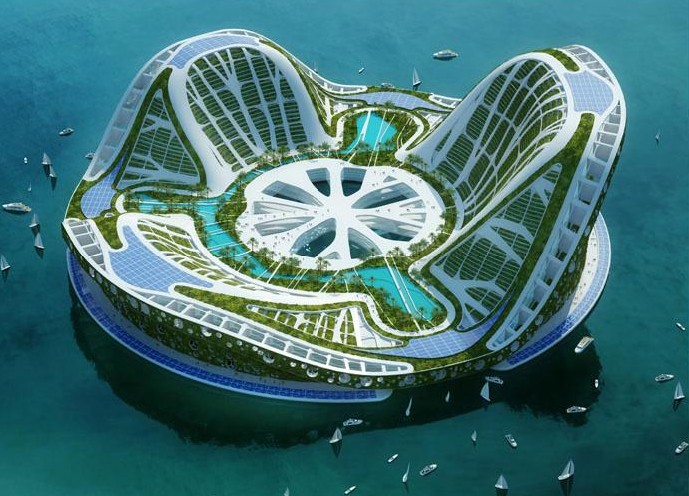In a fascinating article about the perennial attraction of some people to the idea that the U.S. Constitution “has failed” or “is obsolete” and needs to be rewritten, Kevin Williamson mentions that Peter Thiel “is involved in sea-steading, a plan to create autonomous free-trade cities in international waters. Google’s Larry Page pines for ‘safe places’ to experiment free of government interference.”
I must confess that the idea has always held a certain fascination for me as well. It need not involve a radical, total separation from existing society; in fact it probably would not. Right now, the costs of medical care have been so outrageously inflated by bad laws and regulations (all of which, ironically, are intended to expand access to care) that for a while now some companies have actually been paying employees to travel to places like India to receive major surgeries. How hard would it be to buy a surplus aircraft carrier and hang out a shingle twelve miles from Los Angeles? Everybody wins. Okay, okay, maybe they don’t sell aircraft carriers on the secondary market – although they should. But you get the point.
The serious seasteaders, though, don’t strike me as the modest type. They’re rationalistic techno-futurists. So it’s worth noting serious limitations on the possibility of creating your own utopia in international waters.
If anything is clear in the history of political philosophy, it is that civil communities that take up only a small geographic area cannot accommodate a wide latitude for diverse moral viewpoints and practices. People confined to a small space come into conflict with one another more frequently, and the consequences of conflict are higher because getting out of each other’s way is harder. It is simply in the nature of things that small communities must share a much higher degree of moral agreement about what is good, right and fair in human life. Larger communities can accommodate more diversity simply because it is easier to get out of one another’s way on a day-to-day basis; the level of conflict is low enough that it is easier to create political, legal and economic systems where less is taken for granted about how much we agree.
This, in case you have forgotten, is the whole point of Federalist 9-10. It is also the whole point of The Merchant of Venice; in spite of Venice’s proud boast that its laws treat all people equally, the law must actually be animated by a particular moral view, so enforcement of the law necessarily excludes other moral views. And in a city as small as Venice, a Shylock cannot simply be dismissed by the court; his continuing presence in the community is an ongoing threat to public order. He must be crushed – left with no alternatives but to submit to the dominant worldview or flee.
All this becomes much clearer when you think about the practical challenges involved in a seastead. How will conflicts be resolved? What’s the political system? With so few people in such a small space, I can see only two real practical alternatives. The optimistic scenario is that the seastead is created by a community that had a strong shared value system before they embarked for international waters; in this case, the specific process for resolving conflicts is less important because in practice conflicts will always be resolved according to that shared value system, whatever the process. Social legitimization would demand it. The less optimistic scenario, which unfortunately is the one more likely to occur in real life, is that the seasteaders – influenced by the rationalism of techno-futurist ideologies – believe they can write a set of clear, rational rules that will make the correct resolution of conflicts plain. All they need then is a relatively simple quasi-court system to enforce the rules. In real life, such a system will lead to major conflicts relatively quickly, because it is not in the nature of justice to be reduced to a set of clear, rational rules that can be written down. The conflicts will be absolutized because each side of the conflict, influenced by techno-futurist rationalism, will believe that the other side is irrational and illegitimate. The likely outcome would be, in effect, the dictatorship of a charismatic leader.
In short, seasteads can’t be independent of real, morally “thick” communities. They could work if they brought their community with them from the shore, to provide shared meanings for the moral terms that their rules must enforce. If they are set up as a flight from community, they will have what political philosophers have always recognized is the only form of government possible without community: tyranny.
